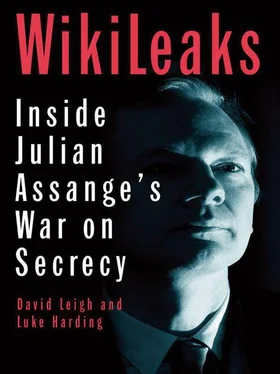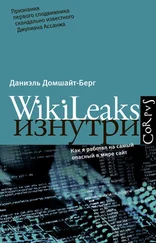Harding, Luke - WikiLeaks - Inside Julian Assange's War on Secrecy
Здесь есть возможность читать онлайн «Harding, Luke - WikiLeaks - Inside Julian Assange's War on Secrecy» весь текст электронной книги совершенно бесплатно (целиком полную версию без сокращений). В некоторых случаях можно слушать аудио, скачать через торрент в формате fb2 и присутствует краткое содержание. Жанр: Старинная литература, на английском языке. Описание произведения, (предисловие) а так же отзывы посетителей доступны на портале библиотеки ЛибКат.
- Название:WikiLeaks: Inside Julian Assange's War on Secrecy
- Автор:
- Жанр:
- Год:неизвестен
- ISBN:нет данных
- Рейтинг книги:3 / 5. Голосов: 1
-
Избранное:Добавить в избранное
- Отзывы:
-
Ваша оценка:
- 60
- 1
- 2
- 3
- 4
- 5
WikiLeaks: Inside Julian Assange's War on Secrecy: краткое содержание, описание и аннотация
Предлагаем к чтению аннотацию, описание, краткое содержание или предисловие (зависит от того, что написал сам автор книги «WikiLeaks: Inside Julian Assange's War on Secrecy»). Если вы не нашли необходимую информацию о книге — напишите в комментариях, мы постараемся отыскать её.
WikiLeaks: Inside Julian Assange's War on Secrecy — читать онлайн бесплатно полную книгу (весь текст) целиком
Ниже представлен текст книги, разбитый по страницам. Система сохранения места последней прочитанной страницы, позволяет с удобством читать онлайн бесплатно книгу «WikiLeaks: Inside Julian Assange's War on Secrecy», без необходимости каждый раз заново искать на чём Вы остановились. Поставьте закладку, и сможете в любой момент перейти на страницу, на которой закончили чтение.
Интервал:
Закладка:
Assange’s situation attracted a group of glamorous left-wing Assangistas, many initially rounded up by his lawyers to offer sureties for bail. They included John Pilger, the campaigning UK-based Australian journalist, the British film director Ken Loach, and Bianca Jagger (former wife of Mick), the human rights activist and onetime model. Also present was Jemima Goldsmith, generally described as a socialite. She was to complain about this appellation, tweeting indignantly “‘Socialite’ is an insult to any self respecting person.” From the US, the left-wing documentary maker Michael Moore had pledged to contribute $20,000 bail money, while urging observers “not [to] be naive about how the government works when it decides to go after its prey”. Other well-wishers who would attend subsequent court hearings included Gavin MacFadyen, the former TV producer from City University’s Bureau for Investigative Journalism who over the summer had given Assange a bed in his London townhouse. Some knew Assange personally; others did not. Some seemed convinced that the court case was unconnected with what happened in a Swedish bedroom. Instead, as they saw it, it was an attempt to imprison Assange for his real “crime”: releasing secret documents that humiliated the United States.
For a certain kind of radical, Assange had extraordinary appeal: he was brave, uncompromising and dangerous. Did Pilger and Loach, perhaps, see in Assange the ghosts of their own revolutionary youth? Assange’s targets were those that the original 60s radicals had themselves struggled against – chiefly US imperialism, then in Vietnam, but now in Afghanistan and Iraq. There were other secret abuses Assange had revealed, too: the callousness of the US military, and the widespread use of torture. But the proceedings at Horseferry Road had, strictly speaking, little to do with this.
Several of the broadcasters outside court were also bemused by the celebrities’ spontaneous appearance. When the grey-haired Loach emerged from court, reporters from CNN, broadcasting live, had no idea who he was. “Who was that gentleman? It may be Julian Assange’s attorney; we’re trying to find out,” the stumped CNN anchor said. Jemima Goldsmith’s attendance was even more bizarre. Goldsmith admitted she didn’t know Assange, but said she was offering support for him because of her backing for freedom of speech. This cause had not been one that appealed much to her late father, James Goldsmith, an eccentric right-wing billionaire with a fondness for making libel threats.
For some of Assange’s supporters, the series of extradition and bail proceedings brought by Sweden seemed proof of the US conspiracy. Assange’s lawyer Mark Stephens hinted as much afterwards on the steps of the court. Having compared the Swedish prosecutor Marianne Ny to the murderous Soviet ogre Lavrentiy Beria, Stephens dismissed the sex allegations as “very thin indeed”. He was subsequently to assert that Assange was being imprisoned in the very same cell once occupied by the 19th-century playwright Oscar Wilde, who had been martyred for his sexuality. The homosexual Wilde was later shipped on to a second prison where he wrote his famous Ballad of Reading Gaol . Stephens said many people believed the charges against Assange to be politically motivated. He also referred to a “honeytrap”, implying that Assange had been set up. Assange himself fulminated about what he called the unseen constellation of interests – personal, domestic and foreign – he felt were driving the case forward. The judge’s refusal to grant bail provoked a swirl of more or less ill-informed online outrage.
In the eyes of critics, Assange’s team was embarking on a PR strategy. The effect was to elide Assange’s struggle to bring governments to account (which was a good thing) with allegations of sexual misconduct (which were an entirely separate matter for the courts). Over the ensuing months, these two unrelated issues – the universal principle of freedom of speech, and Assange’s personal struggle to prevent extradition to Sweden – would become entangled. This blurring may have served Assange’s interests. But the talk of honeytraps had a nasty air: it fuelled a global campaign of vilification against the two complaining Swedish women, whose identities rapidly became known around the world.
In Wandsworth, Assange did his best to adjust to his new life as an inmate. He had been remanded in custody for a week. For a man used to spending 16 hours a day in front of a laptop, the underground corridors and clanking Victorian cells must have been a distressing experience. His legal team went away hoping to devise a more successful line of attack. Their job was to get Assange out of jail as soon as possible, certainly in time for Christmas.
Assange’s fame had reached what seemed like galactic proportions by the time of his second appearance in court on 14 December, when a maverick member of the British establishment was at last to ride to his rescue. The crowd outside Westminster court had grown even bigger, with the first reporters setting up their equipment at dawn. Obtaining a pass for the hearing was a bit like getting hold of one of Willy Wonka’s golden tickets; the usual humour and tribal solidarity among journalists gave away to flagrant pushing in and shoving. The court was overflowing by the time Assange – flanked by two private Serco company prison guards – was escorted into the glass-fronted dock. He gave a thumbs-up sign to Kristinn Hrafnsson, his faithful lieutenant. But for the rest of the hearing he sat quietly.
Gemma Lindfield, acting for the Swedish authorities, set out the charges once again. She concluded: “He [Assange] remains a significant flight risk.” It was then the turn of Geoffrey Robertson QC, the prominent human rights lawyer and Assange’s newly hired Australian-born barrister. Standing to address the judge, Robertson began seductively. In melodious tones he described the WikiLeaks founder as a “free-speech philosopher and lecturer”. The idea that he would try and escape was preposterous, he said. Robertson announced that Vaughan Smith of the Frontline Club, Assange’s previous secret hideout host throughout November, was willing to take responsibility for his good behaviour. “Captain Smith”, as Robertson winningly described him, was prepared to house Assange once again up at Ellingham Hall in Norfolk, should the judge agree to give him bail.
The WikiLeaks arrest saga had so far been short of jokes. But Robertson had one ready-made. It would not be so much “house arrest as mansion arrest”, he quipped. Not only that, but it was inconceivable Assange would attempt to escape “since darkness descends rather early in that area of Britain”. Additionally, Assange was willing to give up his Australian passport and wear an electronic tag. Finally, he wasn’t likely to get very far given that “media exposure” had made him “well-known around the world”.
Robertson invited Smith to give his own assessment of WikiLeaks’ controversial founder. “He is a very honourable person, hugely courageous, self-deprecatory and warm. Not the kind of things you read about,” Captain Smith said, loyally.
After establishing that Smith was a former Guards officer and one-time captain of the British army’s shooting team, the QC asked for details of Smith’s family home. That, it appeared, was the clincher. “It has 10 bedrooms and 60 acres.” Better still, there was even a police station. “It’s a short distance on a bicycle. I can cycle it in about 15 minutes … It’s about a mile. Perhaps a little bit more.” Smith added helpfully: “It’s an environment where he would be surrounded. We have members of staff. My parents live in proximity as well. My father was a Queen’s Messenger and a colonel in the Grenadier Guards. He patrols the estate.” Smith added that his housekeeper, too, could keep a beady eye on the Australian: “My staff will be reporting to me, sir.”
Читать дальшеИнтервал:
Закладка:
Похожие книги на «WikiLeaks: Inside Julian Assange's War on Secrecy»
Представляем Вашему вниманию похожие книги на «WikiLeaks: Inside Julian Assange's War on Secrecy» списком для выбора. Мы отобрали схожую по названию и смыслу литературу в надежде предоставить читателям больше вариантов отыскать новые, интересные, ещё непрочитанные произведения.
Обсуждение, отзывы о книге «WikiLeaks: Inside Julian Assange's War on Secrecy» и просто собственные мнения читателей. Оставьте ваши комментарии, напишите, что Вы думаете о произведении, его смысле или главных героях. Укажите что конкретно понравилось, а что нет, и почему Вы так считаете.












